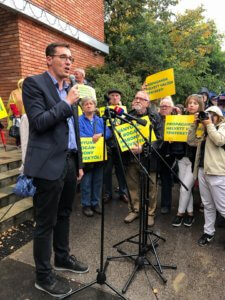As of Monday morning, four of the five largest Hungarian cities are now controlled by the Hungarian opposition. Their election victories have caused serious damage to the ruling Fidesz party after a painfully long learning process. While this is the first time in 13 years that Viktor Orbán cannot claim unequivocal victory in an electoral competition, Sunday’s local elections are but the first step in what is a process of dismantling his semi-authoritarian regime.
Catastrophically defeated in three consecutive parliamentary elections (2010, 2014 and 2018), the Hungarian opposition saw this round as its last chance to get back in the game – or face total irrelevance and annihilation. There were modest signs for optimism, but the results surpassed any realistic expectations.
Two-time mayor of Budapest, István Tarlós lost his seat to the opposition candidate, Gergely Karácsony, while 14 of the 23 capital city districts now also have opposition mayors. Of the won 19 Fidesz mayors elected during the last municipal election in 2014, only 9 remain. Furthermore, 5 out of those will be forced to cooperate with opposition-dominated local councils.

The opposition also won in 10 out of the 23 most important cities of Hungary (the so-called cities with county rights), having won only two last cycle. All in all, in the urban areas of the country, near-total Fidesz dominance has transformed into parity with the opposition.
In the countryside, however, the appeal of Viktor Orbán’s party remains unchallenged, with Fidesz winning overall majorities in 19 county councils, and in most rural areas.
In order to explain such an outcome, we have to take into account a complex set of interrelated causes. The most important one – the sine qua non, so to speak – was the fact that the various parties of the opposition truly managed to present a unified front.
Contrary to previous elections, the parties – ranging from the once far-right Jobbik to the young liberal Momentum – managed to coordinate their efforts, and as a consequence Fidesz candidates had to face a single challenger in the most important cities and towns. These one-on-one races visibly galvanized opposition supporters and produced higher rates of mobilization in comparison to Fidesz’s base.
When we look at the cities and districts of Budapest conquered by the opposition, an interesting pattern emerges: Fidesz incumbents did not lose votes( in many cases they actually got more votes than in 2014) but rather the votes cast for opposition candidates surpassed even normal levels. Districts that have elected right-wing candidates since 1990 now have left-wing and green mayors. This is the case with Budapest’s first district, home to the famous Buda Castle and Prime Minister Orbán’s office.
It took many long years for opposition parties to understand that the parameters of the electoral system constructed by Fidesz after 2010 absolutely require a unified opposition. To create such a front, their electorates would also need patient socialization and nurturing before it would become possible for a Jobbik voter to cast its vote in favor of a left-wing candidate, and vice versa. But the parties succeeded, and the rewards are obvious.
The unification of the opposition not only made the choices on the ballot simpler for the electorate, but it also gave candidates the opportunity to articulate and publicize an alternative leadership vision, instead of being tied down by counterproductive inter-party squabbles. This was perhaps most palpable in Budapest, where the energetic Karácsony had been touring the city’s neighborhoods with the message of a just and green Budapest, while the aging Tarlós was hidden away by Fidesz’s propaganda machine.
Fidesz ran a profoundly negative campaign whose only aim was to demobilize the non-affiliated voters and delegitimize the opposition. While this strategy has proven successful in the past, this time it remained largely inconsequential. The dirt thrown on the opposition candidates did not stick.
One important reason for this was that a scandal concerning the mayor of Győr, one of Hungary’s most prosperous cities, overshadowed everything else and captured the interest of voters with a baffling intensity. Less than two weeks before election day an anonymous blog started publishing photos and videos showing the Fidesz mayor, Zsolt Borkai – a married, father of two with an Olympic medal in gymnastics – having sex with young women aboard a luxury yacht, accompanied by business associates from Győr.
The Borkai scandal made visible not only the hypocrisy of Fidesz’s religious-conservative rhetoric, but also the party’s shady business dealings.. Without entering into the details of the web of corruption unraveling in the booze and cocaine-filled scenes, it is sufficient to say that two of the young women participating in what has become known as the “Borkai orgy” were also beneficiaries of EU funds managed by Hungarian authorities.
Uncharacteristic for Fidesz, the party machinery proved to be unable to control the damage caused by the scandal, and this might have contributed to the demobilization of many upper and middle class Fidesz voters and, consequently, to the defeats in many of the more bourgeois urban areas previously considered party strongholds.
Apart from these two important factors — the unification of the opposition and the Borkai tapes — there is a third worth mentioning:considerable grass roots energy.
Maybe the best example for this is Budapest’s eighth district where many of the political and social perversities of Fidesz-rule are most visible. Formerly famous for being a run-down, poor and crime-ridden neighborhood, the eighth district was captured by Fidesz in 2009. Through a process of aggressive gentrification and meticulous political control, consecutive Fidesz administrations so profoundly transformed the electorate that the party seemed undefeatable here. And yet, former journalist and grassroots activist András Pikó not only won the district’s mayoral race, but the opposition also gained a strong majority in the local council as well.
Formally nominated by the liberal Momentum party and supported by all the opposition parties, Pikó and his successful campaign, however, can largely be attributed to the intense and program-driven campaign undertaken by grassroots civic organizations across the district. With an electoral program based on social justice and egalitarianism, Pikó and his team plowed through the entire district, knocked on every door, and established a continuous street presence; all of which placed them in stark contrast with an arrogant administration that relied on overt political intimidation, bribery and fanatical law and order rhetoric that bordered on fascist.
To achieve their electoral victory, Pikó’s team carefully studied the lessons of the municipalist movement of Barcelona’s mayor, Ada Colau. Pikó’s campaign chief, Tessza Udvarhelyi — a prominent activist in Budapest’s radical left-wing circles — participated in Colau’s re-election campaign. Another important pillar of the campaign was the recently founded Free Budapest group which was comprised of young radical left-wing activists, who — among other local NGO-s and grassroots groups — provided the campaign’s manpower.
Free Budapest was established a few months prior to the elections with the purpose of challenging the Hungarian radical left’s aversion towards institutionalized politics and in order to acquire skills necessary for running successful campaigns. Besides the Pikó campaign, the group has also provided support for the independent anti-corruption activist, Krisztina Baranyi who won a landslide victory in the ninth district’s mayoral race.
Hungary will not hold a national election until 2022, so Sunday’s municipal elections were of utmost importance for the opposition. Weakened by 9 years of authoritarian rule and a lack of resources, the opposition was able to show that even small successes can lay the foundations for the future. Their local victories offer the possibility of building alternative models of governance, and the material resources gained now are also vital sustaining any political alternative to Fidesz.
Speaking in front of the press Sunday evening, Prime Minister Orbán nominally acknowledged the results of the election and promised to cooperate with the new local authorities. Yet most of the analysts expect an aggressive offensive against these islands of dissent. With no elections in sight, Fidesz can now continue its assault on independent institutions, the free press, and opposition-held cities with renewed fervor In these conditions, the importance of a growing opposition cannot be overstated.
Sunday’s local elections provide the starting point for this. However, the very heterogeneous opposition, with diverging factional interests and uneven moral quality, cannot rest on this unexpected success. The work has just begun.
![Political Critique [DISCONTINUED]](https://politicalcritique.org/wp-content/uploads/2015/09/Political-Critique-LOGO.png)
![Political Critique [DISCONTINUED]](https://politicalcritique.org/wp-content/uploads/2015/09/Political-Critique-LOGO-2.png)
